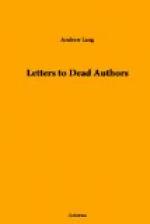An English critic (probably a Northerner at heart) has described them as ‘Hawthorne and delirium tremens.’ I am not aware that extreme orderliness, masterly elaboration, and unchecked progress towards a predetermined effect are characteristics of the visions of delirium. If they be, then there is a deal of truth in the criticism, and a good deal of delirium tremens in your style. But your ingenuity, your completeness, your occasional luxuriance of fancy and wealth of jewel-like words, are not, perhaps, gifts which Mr. Hawthorne had at his command. He was a great writer—the greatest writer in prose fiction whom America has produced. But you and he have not much in common, except a certain mortuary turn of mind and a taste for gloomy allegories about the workings of conscience.
I forbear to anticipate your verdict about the latest essays of American fiction. These by no means follow in the lines which you laid down about brevity and the steady working to one single effect. Probably you would not be very tolerant (tolerance was not your leading virtue) of Mr. Roe, now your countrymen’s favourite novelist. He is long, he is didactic, he is eminently uninspired. In the works of one who is, what you were called yourself, a Bostonian, you would admire, at least, the acute observation, the subtlety, and the unfailing distinction. But, destitute of humour as you unhappily but undeniably were, you would miss, I fear, the charm of ‘Daisy Miller.’ You would admit the unity of effect secured in ‘Washington Square,’ though that effect is as remote as possible from the terror of ‘The House of Usher’ or the vindictive triumph of ‘The Cask of Amontillado.’
Farewell, farewell, thou sombre and solitary spirit: a genius tethered to the hack-work of the press, a gentleman among canaille, a poet among poetasters, dowered with a scholar’s taste without a scholar’s training, embittered by his sensitive scorn, and all unsupported by his consolations.
XV.
To Sir Walter Scott, Bart.
Rodono, St. Mary’s
Loch:
Sept. 5, 1885.
Sir,—In your biography it is recorded that you not only won the favour of all men and women; but that a domestic fowl conceived an affection for you, and that a pig, by his will, had never been severed from your company. If some Circe had repeated in my case her favourite miracle of turning mortals into swine, and had given me a choice, into that fortunate pig, blessed among his race, would I have been converted! You, almost alone among men of letters, still, like a living friend, win and charm us out of the past; and if one might call up a poet, as the scholiast tried to call Homer, from the shades, who would not, out of all the rest, demand some hours of your society? Who that ever meddled with letters, what child of the irritable race, possessed even a tithe of your simple manliness, of the heart that never knew a touch of jealousy, that envied no man his laurels, that took honour and wealth as they came, but never would have deplored them had you missed both and remained but the Border sportsman and the Border antiquary?




